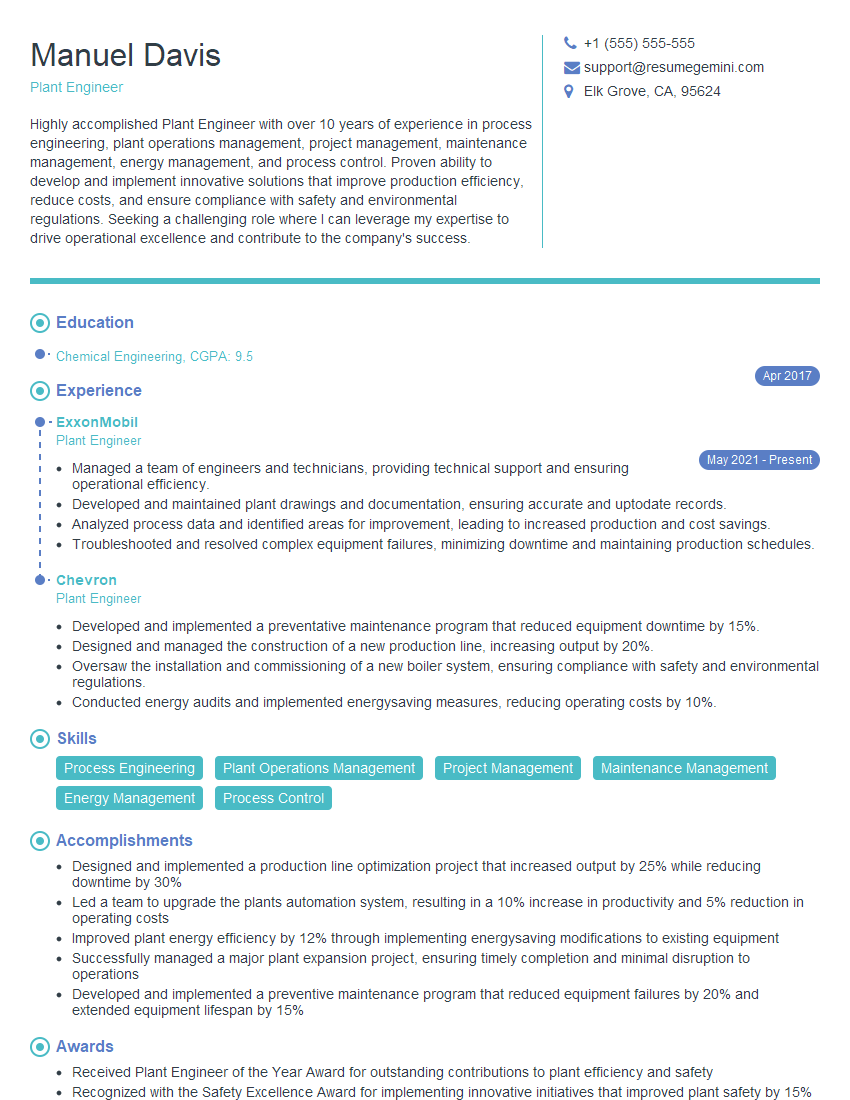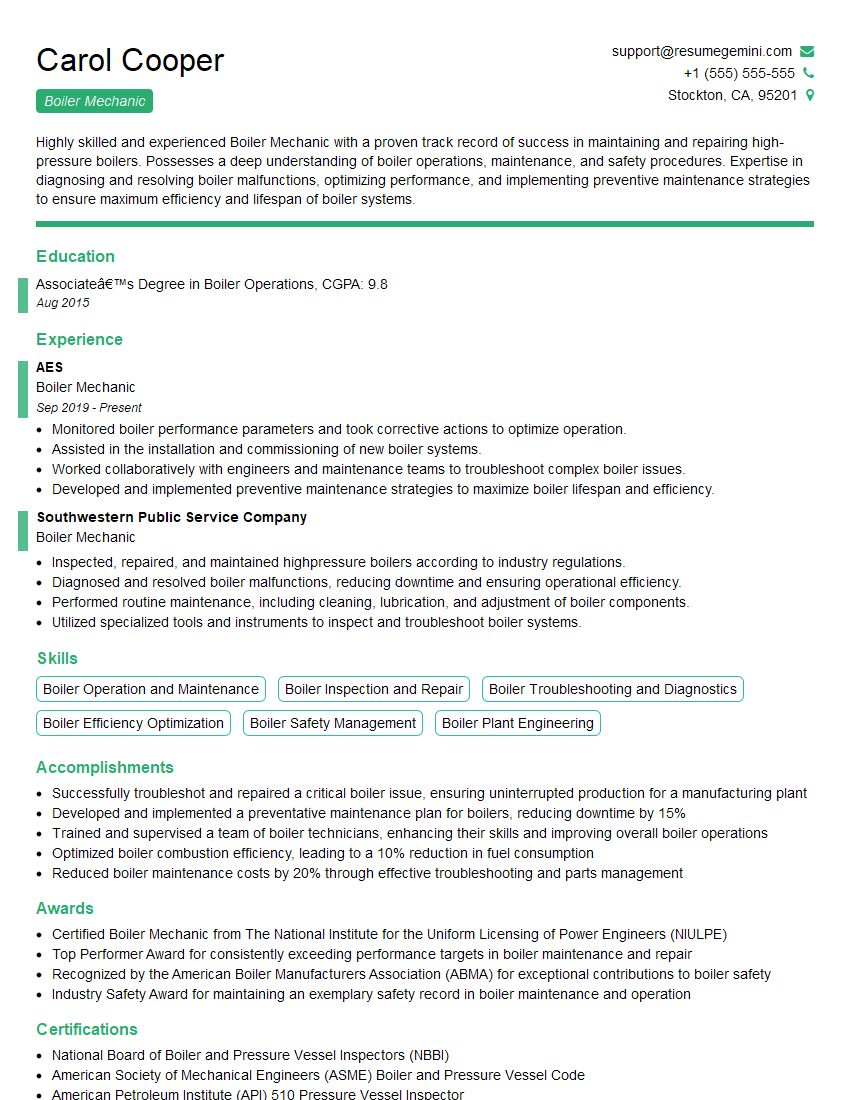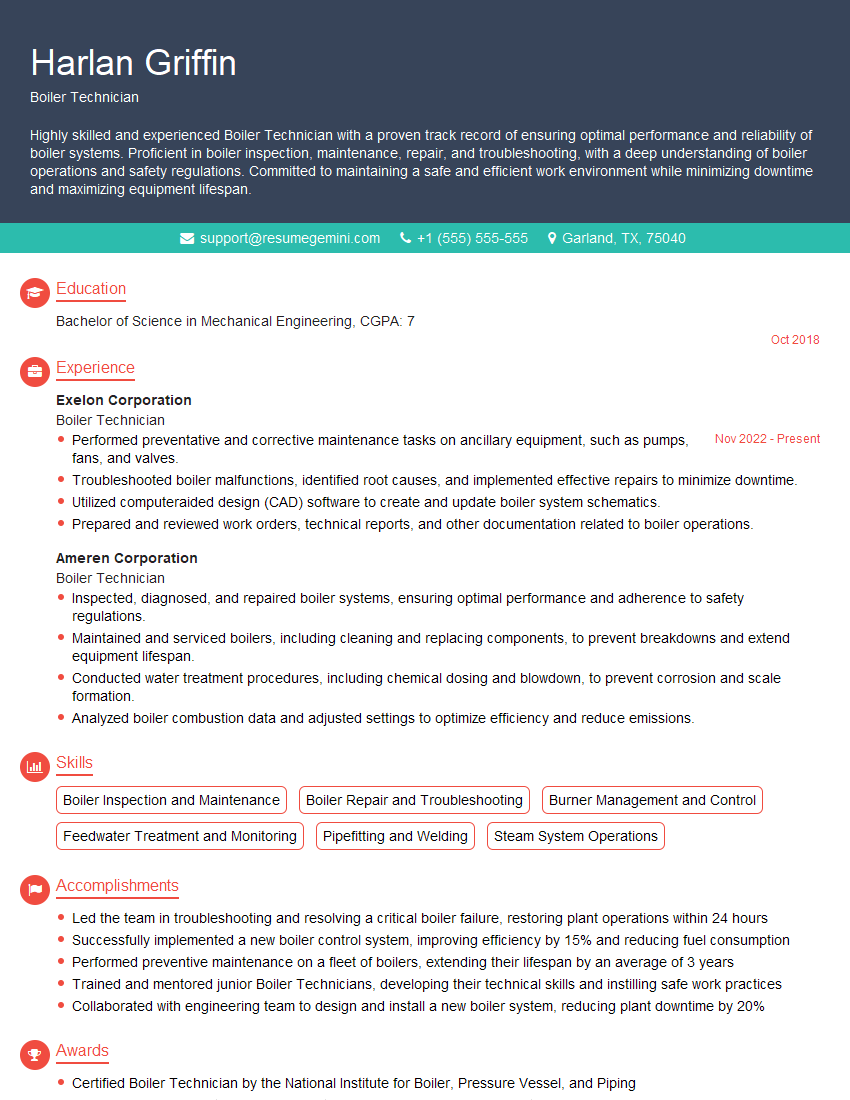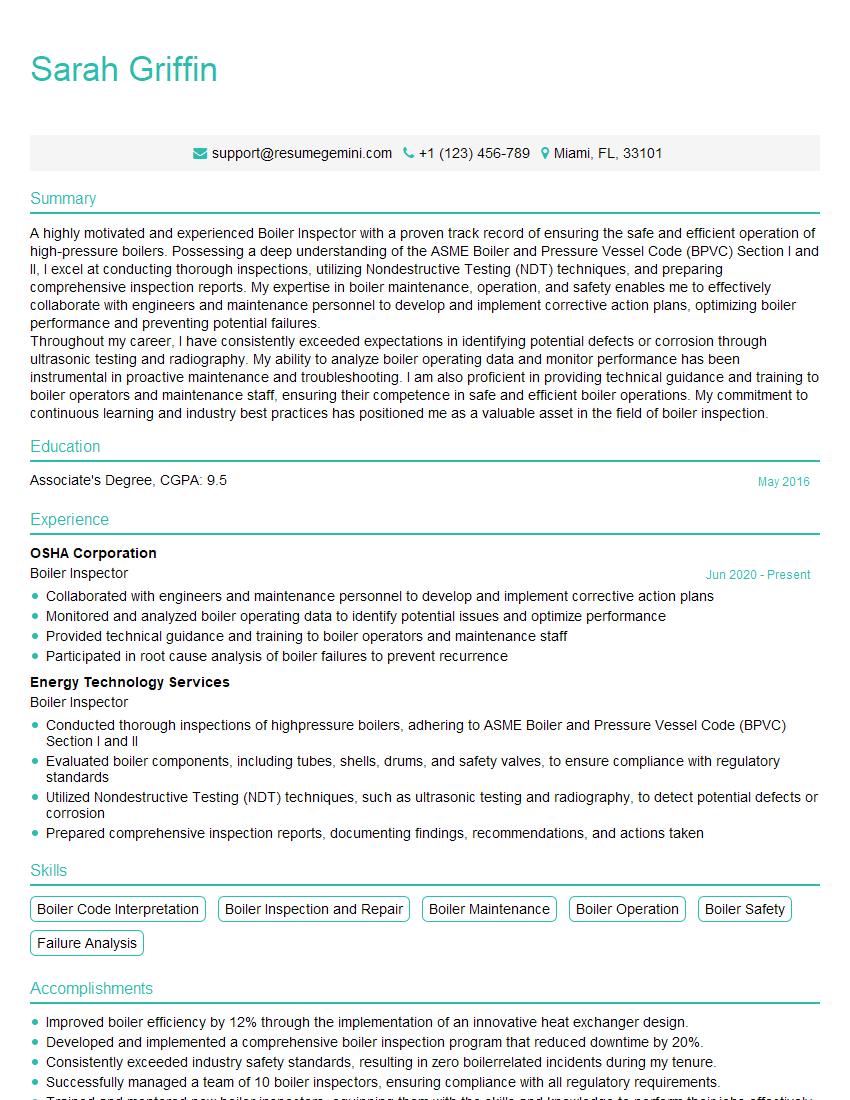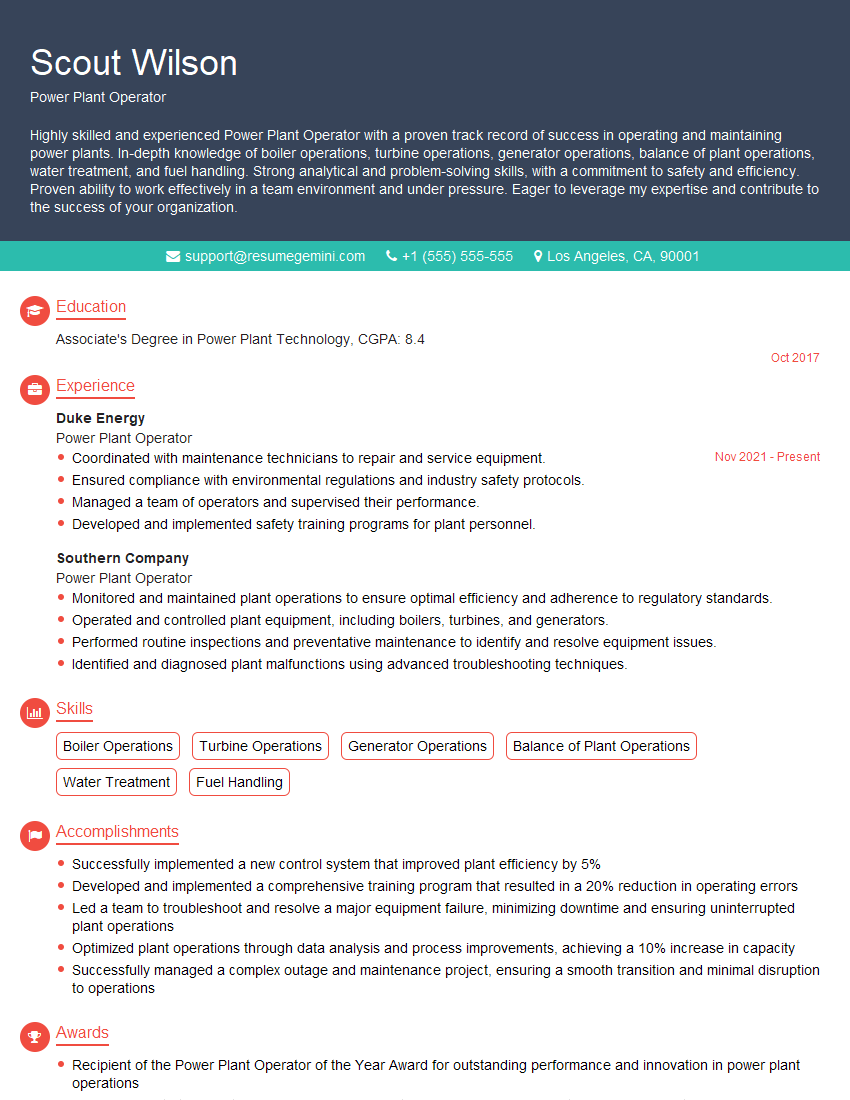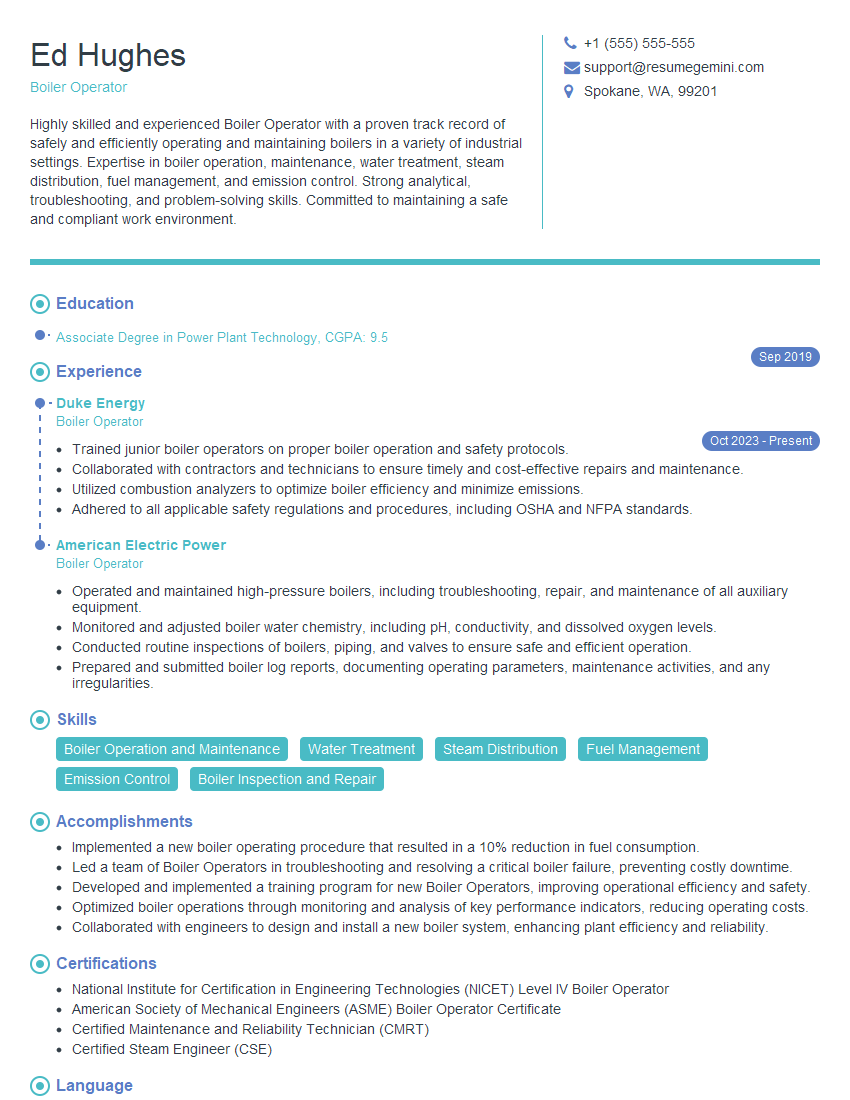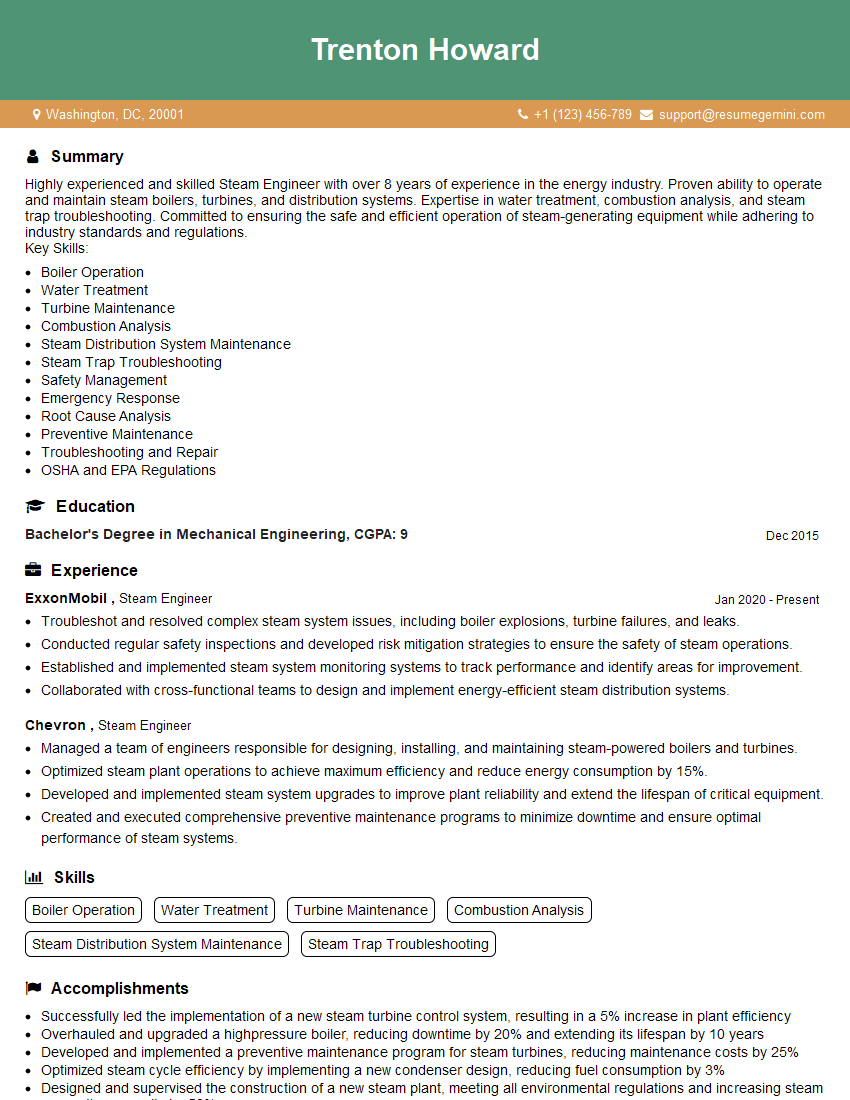Feeling uncertain about what to expect in your upcoming interview? We’ve got you covered! This blog highlights the most important Boiler Equipment Techniques interview questions and provides actionable advice to help you stand out as the ideal candidate. Let’s pave the way for your success.
Questions Asked in Boiler Equipment Techniques Interview
Q 1. Explain the different types of boilers and their applications.
Boilers are classified based on several factors, including the method of heat transfer, fuel type, and steam pressure. Here are some common types:
- Fire-tube boilers: Hot gases pass through tubes surrounded by water. They are simpler, less expensive, and ideal for smaller applications like heating buildings or providing low-pressure steam for small processes. Think of them like a tea kettle, where the heat source surrounds the water container.
- Water-tube boilers: Water circulates inside tubes that are surrounded by hot gases. These are preferred for high-pressure, high-capacity applications like power generation and large industrial processes. They’re much more robust and capable of handling higher pressures than fire-tube boilers.
- Electric boilers: These use electricity to heat water, offering clean operation and precise temperature control. They’re suitable for smaller facilities and where fuel supply or environmental concerns are paramount.
- Packaged boilers: These are pre-assembled units that are easy to install and maintain. They are compact, ideal for smaller industrial and commercial applications.
The choice of boiler type depends on several factors, including the required steam capacity, pressure, fuel type availability, budget, space constraints, and environmental considerations.
Q 2. Describe the water treatment process crucial for boiler operation.
Water treatment is critical for preventing scale buildup, corrosion, and other problems that can damage the boiler and reduce its efficiency. The process typically involves several steps:
- Pre-treatment: This involves removing large particles and suspended solids through filtration or sedimentation.
- Chemical Treatment: This is crucial for removing dissolved solids (like hardness minerals – calcium and magnesium) and preventing corrosion. Common treatments include softening (removing hardness minerals), adding oxygen scavengers (to prevent corrosion), and using scale inhibitors (to prevent the formation of deposits).
- Monitoring and Control: Regularly monitoring water parameters like pH, alkalinity, and conductivity helps in adjusting chemical treatment accordingly.
Imagine your boiler as a delicate machine; untreated water is like pouring sand and rust into its engine. Regular and appropriate water treatment is essential for maintaining its longevity and optimal performance.
Q 3. How do you troubleshoot a low steam pressure situation?
Low steam pressure can have various causes. A systematic approach is crucial for effective troubleshooting:
- Check the fuel supply: Ensure adequate fuel is available and the burner is functioning correctly. A low fuel supply directly reduces heat input to the boiler.
- Inspect the burner flame: A weak or unstable flame indicates potential issues with the burner itself, air supply, or fuel delivery system. This might require adjusting the air-fuel ratio.
- Examine water level: Low water levels will drastically reduce steam production. Top up water carefully if necessary and investigate the cause of low water (leakage, faulty feedwater pump).
- Check for air leaks: Air in the steam system reduces pressure and efficiency. Look for leaks at joints and valves.
- Assess steam traps: Faulty steam traps can restrict steam flow, causing low pressure in the system.
- Inspect safety valves: Ensure safety valves are not stuck open, allowing steam to escape prematurely.
Remember safety first! Before undertaking any troubleshooting, ensure the boiler is shut down and allowed to cool down if necessary.
Q 4. What are the safety precautions involved in boiler operation and maintenance?
Boiler operation and maintenance are inherently hazardous, requiring strict adherence to safety precautions:
- Lockout/Tagout procedures: Always follow established lockout/tagout procedures before any maintenance or repair work to prevent accidental startup.
- Personal Protective Equipment (PPE): Wear appropriate PPE, including safety glasses, gloves, and heat-resistant clothing.
- Regular inspections: Conduct regular inspections of pressure gauges, safety valves, and other critical components.
- Proper ventilation: Ensure adequate ventilation to prevent the buildup of harmful gases.
- Emergency procedures: Develop and practice emergency procedures for fire, leaks, or other potential hazards.
- Training and certification: Operators and maintenance personnel should receive adequate training and certification to operate and maintain boilers safely.
Treating boiler operation with anything less than utmost caution can lead to serious injuries or fatalities. Following safety procedures is non-negotiable.
Q 5. Explain the importance of boiler efficiency and how to improve it.
Boiler efficiency is crucial for reducing operational costs and minimizing environmental impact. It refers to the ratio of heat output to heat input. Improving efficiency involves several strategies:
- Regular maintenance: Cleaning boiler tubes and removing scale helps in improving heat transfer.
- Optimizing combustion: Proper air-fuel ratio adjustment ensures complete combustion and reduces fuel wastage.
- Insulation: Adequate insulation of the boiler and piping reduces heat loss.
- Improved controls: Implementing advanced controls like modulating burners can optimize fuel consumption based on demand.
- Energy recovery systems: Utilizing waste heat from the boiler for other applications (e.g., preheating feedwater) improves overall efficiency.
Think of it like driving a car: regular maintenance and efficient driving techniques improve fuel economy. Similarly, proper attention to boiler efficiency translates to significant cost savings and a smaller carbon footprint.
Q 6. Describe the different types of boiler feedwater pumps.
Boiler feedwater pumps are essential for supplying water to the boiler. Different types exist, each suited to specific applications:
- Centrifugal pumps: These are the most common type, offering high flow rates and relatively low pressure. They are ideal for most boiler applications.
- Reciprocating pumps: These provide high pressure at low flow rates, suitable for applications requiring high-pressure feedwater.
- Positive displacement pumps: These pumps provide a constant flow rate regardless of pressure changes and are often used for feedwater systems requiring precise control.
The selection of the feedwater pump depends on factors like the boiler’s capacity, required pressure, and the characteristics of the feedwater.
Q 7. How do you diagnose and fix a boiler leak?
Diagnosing and fixing a boiler leak requires careful investigation and may involve different techniques depending on the location and severity of the leak:
- Identify the leak location: Visually inspect the boiler for signs of leakage (water dripping, staining).
- Determine the leak cause: Is it due to corrosion, erosion, or a faulty weld? This helps determine the appropriate repair method.
- Minor leaks: Small leaks can sometimes be temporarily sealed with specialized boiler sealants. However, this is a temporary fix; a more permanent solution is always recommended.
- Major leaks: Larger leaks often require more extensive repair work, potentially involving welding or replacing damaged sections. This necessitates shutting down and draining the boiler.
- Pressure Testing: After repair, pressure testing is crucial to ensure the repair has been successful and the boiler is safe for operation.
Remember to always consult with qualified boiler technicians for any significant leaks or repairs. Attempting to fix a major leak without expertise is incredibly dangerous.
Q 8. What are the common causes of boiler scale formation and how to prevent it?
Boiler scale formation is a common problem caused by the deposition of mineral salts from hard water onto boiler internal surfaces. These deposits, primarily calcium and magnesium carbonates and sulfates, reduce heat transfer efficiency, leading to increased fuel consumption and potential overheating.
- High water hardness: The primary culprit. Hard water, rich in dissolved minerals, is the main source of scale formation. Think of it like slowly building up a layer of limescale in your kettle.
- High boiler water concentration: As water evaporates, the concentration of dissolved solids increases, promoting precipitation and scale build-up. It’s like salt crystals forming when seawater evaporates.
- High boiler water temperature: Higher temperatures increase the solubility of minerals, causing them to deposit more readily as they cool on the boiler surfaces.
- Poor water treatment: Insufficient or ineffective water treatment is a major contributor. This includes failing to use water softeners or chemical treatments.
Prevention involves a multi-pronged approach:
- Water softening: Utilizing a water softener to remove minerals before they enter the boiler is the most effective strategy. This could involve ion exchange or other softening methods.
- Chemical treatment: Employing appropriate chemical treatments like scale inhibitors and dispersants prevents mineral precipitation and keeps existing scale from growing. Regularly monitoring and adjusting chemical levels is crucial.
- Regular blowdown: Periodically removing a portion of the boiler water removes accumulated dissolved solids, reducing concentration and preventing scale formation. We will discuss blowdown in more detail later.
- Proper boiler operation: Maintaining optimal water levels and temperatures minimizes scale formation. Avoiding overheating is critical.
- Regular inspections: Regular internal inspections help detect early signs of scale and allow for timely intervention.
Q 9. Explain the role of boiler safety valves and pressure relief valves.
Boiler safety valves and pressure relief valves are crucial safety devices designed to protect the boiler and its surrounding environment from overpressure. They are fundamentally similar in function but may have slightly different applications or settings.
Safety valves are designed to automatically relieve excess pressure should the boiler pressure exceed a predetermined set point. They are usually spring-loaded and open rapidly to discharge steam, preventing catastrophic failure. They are typically set to open at a slightly higher pressure than the pressure relief valve.
Pressure relief valves are also designed to relieve excess pressure, but they may be used in other applications besides preventing boiler overpressure. For example, they might be utilized to safeguard against pressure buildup in other parts of the system. They can be spring-loaded or pilot-operated, and their opening characteristics might be slower than a safety valve.
In essence, both act as a last line of defense, preventing dangerous pressure buildups. Regular inspection and testing of these valves are essential to ensure they operate correctly and reliably when needed. Think of them as the emergency exits of your boiler system – you hope you never need them, but it’s critical that they work flawlessly if the need arises.
Q 10. How do you perform a boiler inspection and what are you looking for?
A boiler inspection is a critical procedure to ensure safe and efficient operation. It’s a systematic visual and sometimes instrumental examination of various boiler components. The frequency and extent of the inspection depend on the boiler type, size, and operating conditions, but generally, it involves:
- External examination: Checking for leaks, corrosion, damage to insulation, proper functioning of safety devices, and overall condition of the boiler shell and mountings.
- Internal examination: This may require taking the boiler out of service. It involves a thorough inspection of the internal surfaces for scale buildup, pitting, corrosion, and any damage to tubes or other internal components. Specialized tools like borescopes might be used.
- Controls and instrumentation: Inspecting gauges, switches, controllers, and other instrumentation to ensure accuracy and proper functioning.
- Burner inspection: Checking the burner for damage, proper alignment, cleanliness, and safe operation. This might include checking the flame pattern and air-fuel ratio.
- Water treatment review: Reviewing the water treatment logs and analyzing samples to assess the effectiveness of the treatment process and identify potential issues.
- Documentation: Thorough record keeping is vital. All findings, including maintenance performed, must be carefully documented.
During an inspection, you’re looking for:
- Corrosion: Pitting, scaling, or general deterioration.
- Leaks: Any signs of water or steam leaks.
- Damage: Physical damage to tubes, welds, or other components.
- Scale buildup: Excessive scale formation significantly reduces efficiency and can lead to failure.
- Malfunctioning safety devices: Ensure safety valves and pressure relief valves are functioning correctly.
Regular inspections help proactively identify potential problems before they escalate into major failures, ensuring both safety and efficiency.
Q 11. Describe the process of boiler blowdown and its significance.
Boiler blowdown is the process of periodically removing a portion of boiler water from the boiler drum to control the concentration of dissolved solids. Think of it as regularly draining a small amount of water to keep the overall salinity of the boiler water at a safe level.
Significance:
- Scale prevention: Removing concentrated solids prevents scale formation.
- Corrosion control: Reducing the concentration of dissolved oxygen and other corrosive agents helps protect the boiler from corrosion.
- Maintaining water purity: Removing impurities keeps the boiler water clean and prevents operational issues.
- Maintaining boiler efficiency: Prevents the accumulation of solids that reduce heat transfer efficiency.
Process: Blowdown is typically performed using either continuous or intermittent methods. Continuous blowdown involves a small, continuous flow of water being removed. Intermittent blowdown involves periodically opening a valve to rapidly remove a larger volume of water. The specific method and frequency depend on factors such as boiler water quality and operating conditions. Properly controlled blowdown is essential for maintaining optimal boiler operation and preventing damage.
Q 12. What are the common problems associated with boiler burners?
Boiler burners are complex components responsible for efficiently and safely burning fuel to generate heat. Common problems include:
- Incomplete combustion: Caused by insufficient air supply, improper fuel-air mixture, or burner malfunction. Results in wasted fuel and the production of harmful pollutants.
- Flame instability: Erratic flame patterns indicate problems with fuel supply, air distribution, or ignition system. It can lead to uneven heating and potential safety hazards.
- Fuel nozzle problems: Clogged or damaged nozzles lead to improper fuel atomization, resulting in poor combustion.
- Ignition problems: Ignition system failures can prevent or disrupt combustion. This could involve issues with spark plugs, igniters, or control systems.
- Airflow problems: Insufficient or uneven airflow can lead to incomplete combustion. This might involve issues with the air registers or fan.
- Soot buildup: Excessive soot buildup indicates poor combustion and can reduce efficiency and create safety concerns.
These problems often require troubleshooting involving visual inspection, combustion analysis, and potentially specialized testing equipment. Regular maintenance and cleaning of burners are essential for reliable and efficient operation.
Q 13. Explain the principles of combustion in a boiler.
Combustion in a boiler involves the controlled burning of fuel (usually gas, oil, or coal) with air to produce heat. This heat is then transferred to the boiler water, generating steam. The process is governed by several key principles:
- Stoichiometry: The proper ratio of fuel and air is crucial for complete combustion. Too much air results in wasted energy; too little air leads to incomplete combustion and the formation of harmful byproducts.
- Heat transfer: Efficient heat transfer from the combustion products (hot gases) to the boiler water is vital. This is influenced by factors like boiler design, surface area, and water flow rate.
- Flame characteristics: The flame’s stability, shape, and temperature affect combustion efficiency. Proper burner design and operation are critical.
- Energy balance: A balance must be maintained between the energy input from the fuel and the energy output in the form of steam. Monitoring these parameters is crucial for efficiency.
- Environmental considerations: The combustion process should minimize the emission of pollutants like carbon monoxide, nitrogen oxides, and particulate matter. Emission control technologies might be necessary.
Understanding these principles allows for optimization of the combustion process to maximize efficiency, minimize emissions, and ensure safe operation.
Q 14. How do you interpret boiler instrumentation and control readings?
Boiler instrumentation and control readings provide vital information on the boiler’s performance and operating conditions. Understanding these readings is crucial for safe and efficient operation. Key parameters include:
- Pressure: Steam pressure gauges indicate the pressure within the boiler drum. This is critical for safe operation and steam production.
- Temperature: Temperature gauges monitor water and steam temperatures at various points in the system. This helps ensure efficient heat transfer and prevents overheating.
- Water level: Water level indicators show the level of water in the boiler drum. Maintaining the correct water level is essential to prevent overheating or low-water conditions.
- Fuel flow rate: This measurement indicates the amount of fuel being burned. It helps monitor fuel consumption and efficiency.
- Air flow rate: Monitoring air flow helps maintain the correct fuel-air ratio for efficient combustion.
- Combustion efficiency: This measurement, often obtained through an oxygen analyzer, indicates how effectively the fuel is being burned.
- Stack gas temperature and analysis: These readings provide insights into combustion efficiency and emission levels.
Interpreting these readings requires knowledge of normal operating ranges and the ability to identify deviations that might indicate potential problems. Consistent monitoring and prompt action based on these readings are critical for preventing operational issues and ensuring safe and efficient boiler operation.
Q 15. Describe your experience with different types of boiler controls.
My experience with boiler controls spans a wide range of technologies, from traditional pneumatic systems to sophisticated digital control systems employing Programmable Logic Controllers (PLCs) and distributed control systems (DCS). I’m proficient in configuring and troubleshooting various types of controllers, including those that manage fuel-air ratio, water levels, steam pressure, and safety interlocks. For example, I’ve extensively worked with Honeywell and Siemens controllers, understanding their programming logic and integrating them with various boiler types. I’m also familiar with advanced control strategies like cascade control and feedforward control, crucial for optimizing boiler efficiency and maintaining stable operation. In one project, implementing a cascade control system for a large industrial boiler resulted in a 15% reduction in fuel consumption.
- Pneumatic Controls: These older systems utilize air pressure to regulate various parameters. They are relatively simple but less precise than modern digital systems.
- Electronic Controls: These systems use electronic sensors and actuators for more precise control. They offer advantages like data logging and remote monitoring capabilities.
- PLC-based Controls: Programmable Logic Controllers provide highly flexible and sophisticated control capabilities, allowing for complex automation sequences and advanced control algorithms.
- DCS-based Controls: Distributed Control Systems offer even greater scalability and redundancy, ideal for large and complex boiler systems.
Career Expert Tips:
- Ace those interviews! Prepare effectively by reviewing the Top 50 Most Common Interview Questions on ResumeGemini.
- Navigate your job search with confidence! Explore a wide range of Career Tips on ResumeGemini. Learn about common challenges and recommendations to overcome them.
- Craft the perfect resume! Master the Art of Resume Writing with ResumeGemini’s guide. Showcase your unique qualifications and achievements effectively.
- Don’t miss out on holiday savings! Build your dream resume with ResumeGemini’s ATS optimized templates.
Q 16. How do you handle emergencies such as boiler explosions?
Boiler explosions are extremely serious and require immediate and decisive action. My training emphasizes rapid response and safety protocols. The first priority is to ensure the safety of personnel, evacuating the immediate area and contacting emergency services. After securing the area, we would initiate a systematic investigation to determine the cause, which might involve examining safety valves, pressure gauges, and other critical components. Prevention is key; regular inspection and maintenance according to a rigorous schedule, along with diligent adherence to safety regulations, significantly mitigates the risk of such events. In a past incident involving a minor boiler rupture (not an explosion), I immediately shut down the system, identified the faulty pressure relief valve, and initiated repairs, preventing further escalation.
Our emergency procedures include:
- Immediate evacuation of personnel
- Calling emergency services (fire department, etc.)
- Isolating the affected area
- Investigating the cause of the incident
- Repairing the damage and implementing preventative measures
Q 17. What is your experience with boiler maintenance schedules and preventative maintenance?
Boiler maintenance schedules are critical for safety, efficiency, and longevity. I’m experienced in developing and implementing preventative maintenance (PM) programs based on manufacturers’ recommendations and industry best practices. These schedules typically include regular inspections of critical components like safety valves, pressure gauges, burners, and heat exchangers. I’m proficient in performing tasks such as cleaning, lubricating, and replacing worn parts. For example, a well-structured PM schedule will include cleaning the boiler tubes to remove scale buildup, which improves efficiency and prevents overheating. The frequency of these checks depends on factors such as boiler type, operating hours, and fuel type. A detailed logbook is essential, documenting all PM activities, including dates, performed tasks, and observations.
Beyond routine PM, I have experience conducting thorough inspections to identify potential problems before they escalate into costly failures. Using predictive maintenance techniques, like vibration analysis and thermal imaging, can further enhance the effectiveness of the PM program.
Q 18. Explain your understanding of boiler regulations and codes.
My understanding of boiler regulations and codes is comprehensive. I am familiar with national and local regulations such as ASME (American Society of Mechanical Engineers) codes, which dictate safety standards for boiler design, construction, installation, and operation. I’m adept at interpreting and applying these codes to ensure compliance. Understanding and complying with these codes are not just about avoiding penalties; they are fundamentally about ensuring the safety of personnel and the environment. This includes thorough knowledge of permits, inspections, and certifications needed for boiler operation. For example, I’m familiar with the requirements for regular inspections of pressure relief valves and the documentation needed to prove compliance. I ensure that all our boiler operations remain in complete accordance with these standards.
Q 19. How do you maintain boiler logs and records?
Maintaining accurate boiler logs and records is essential for regulatory compliance, troubleshooting, and optimizing operations. I’m meticulous in documenting all aspects of boiler operation, including daily readings of pressure, temperature, water levels, fuel consumption, and any maintenance activities. This data is crucial for tracking performance, identifying trends, and anticipating potential issues. We utilize both paper-based logs and digital systems for storing and analyzing this information. Digital systems offer advantages like data visualization and trend analysis tools. The logs also document any repairs, inspections, and certifications. These records are regularly audited to confirm compliance and identify areas for improvement. They are also essential in case of any incident or investigation.
Q 20. Describe your experience with different types of boiler fuels.
My experience encompasses various boiler fuels, including natural gas, fuel oil (both light and heavy), and biomass. Each fuel type presents unique characteristics and operational considerations. Natural gas is relatively clean-burning but requires precise control of fuel-air mixture. Fuel oil, especially heavy oil, necessitates careful management of viscosity and requires preheating for efficient combustion. Biomass fuels, such as wood chips or agricultural residues, present challenges related to ash handling and efficient combustion. Understanding the specific properties of each fuel type and their impact on boiler operation is crucial for optimizing efficiency and minimizing emissions. For instance, adjusting the burner settings for different fuel oils requires a precise understanding of their calorific value and viscosity.
Q 21. How do you troubleshoot a boiler that is producing insufficient steam?
Troubleshooting a boiler producing insufficient steam requires a systematic approach. The first step is to carefully analyze the symptoms, collecting data on steam pressure, fuel consumption, water level, and exhaust gas temperature. This data will help isolate the source of the problem. Potential causes include:
- Insufficient Fuel Supply: Check fuel pressure, gas flow rate, or oil pump operation.
- Air-Fuel Ratio Issues: An incorrect air-fuel mixture can lead to incomplete combustion and reduced steam production. Check the burner settings and air supply.
- Scale Buildup: Scale deposits on heat exchanger tubes can reduce heat transfer efficiency. Regular cleaning and water treatment are crucial.
- Fouling: Check for soot or other deposits on heat transfer surfaces.
- Problems with the Feedwater System: Check for insufficient feedwater flow rate, feedwater pump issues, or low water level.
- Malfunctioning Safety Valves: Premature opening of a safety valve can also cause insufficient steam production. This needs immediate attention.
- Burner Issues: Check for proper ignition, flame stability, and any signs of burner malfunction.
A methodical approach, involving checking these elements systematically, combined with experience and knowledge of the boiler system, enables the effective diagnosis and resolution of the problem. Using diagnostic tools like flue gas analyzers can further aid in pinpointing the cause.
Q 22. Explain the importance of proper boiler water chemistry.
Proper boiler water chemistry is paramount for efficient and safe boiler operation. It prevents scaling, corrosion, and other detrimental effects that can lead to costly repairs, downtime, and even catastrophic failure. Think of it like maintaining the health of your boiler; just as you need balanced nutrients for your body to thrive, a boiler needs a specific chemical balance to function optimally.
Maintaining the correct alkalinity, pH, and treating for dissolved oxygen and solids are critical. Scaling, for instance, occurs when minerals in the water precipitate out and form hard deposits on the heat transfer surfaces. This reduces efficiency by insulating the heat transfer surfaces, leading to increased fuel consumption and potentially overheating. Corrosion, on the other hand, is the degradation of metal surfaces due to chemical reactions, leading to leaks and potential boiler failure.
Regular water testing and appropriate chemical treatment programs, tailored to the specific boiler water composition and operating conditions, are essential to maintain optimal water chemistry. This typically involves using various chemicals like oxygen scavengers, pH conditioners, and anti-scalants to address the identified issues.
Q 23. Describe your experience with different types of boiler tubes and their failure modes.
My experience encompasses a wide range of boiler tubes, from carbon steel to various alloys like stainless steel, low-alloy steels, and even specialized materials like titanium in high-pressure, high-temperature applications. Each material has unique properties and failure modes. For example, carbon steel tubes are susceptible to general corrosion, pitting, and scaling, especially under conditions of high dissolved oxygen or low pH. Stainless steel tubes offer better corrosion resistance, but can still fail due to stress corrosion cracking (SCC) under specific conditions like high chloride concentration.
Low-alloy steels, often used in high-pressure boilers, can suffer from creep, a time-dependent deformation at elevated temperatures, eventually leading to tube thinning and failure. I’ve personally dealt with instances of tube failures due to overheating, which can occur from insufficient water flow, scale buildup, or flame impingement. In one case, I investigated a boiler failure where improper installation had led to vibration, resulting in fatigue cracking of the tubes. Identifying the root cause of tube failure requires a thorough investigation, encompassing visual inspection, metallurgical analysis, and reviewing operational data.
Q 24. How do you identify and address boiler corrosion issues?
Identifying boiler corrosion involves a multi-pronged approach. Visual inspection is the first step, looking for signs of pitting, rust, scaling, and other visible signs of corrosion. Water chemistry analysis is crucial, as it reveals the presence of corrosive agents like dissolved oxygen, chloride ions, and low pH. Regular chemical tests are essential and often form the foundation of a proactive corrosion prevention strategy.
Further investigation may involve metallurgical analysis of corroded samples to determine the type and severity of corrosion. Non-destructive testing (NDT) methods, such as ultrasonic testing, can be used to assess the extent of corrosion without damaging the boiler. Addressing corrosion depends on the root cause. If it’s due to poor water chemistry, implementing a suitable water treatment program is the solution. If it’s related to design flaws or operational issues, corrective measures need to be taken. For example, replacing corroded sections, improving water circulation, and ensuring proper boiler operation are all key aspects of addressing the problem.
Q 25. What is your experience with boiler automation and control systems?
I have extensive experience with various boiler automation and control systems, from older pneumatic systems to modern Distributed Control Systems (DCS). I’m proficient in programming PLCs (Programmable Logic Controllers) for various boiler functions including fuel control, combustion optimization, feedwater regulation, and safety interlocks. My experience includes commissioning and troubleshooting these systems. I understand the critical role of these systems in maintaining efficient and safe boiler operation.
Modern DCS systems provide advanced features such as data logging, real-time monitoring, and predictive maintenance capabilities. These features facilitate improved efficiency, reduced downtime, and enhanced safety. For instance, I was involved in upgrading an older boiler system with a DCS, which resulted in a significant improvement in fuel efficiency and reduced emissions. The new system provided advanced monitoring capabilities, helping us proactively identify and address potential problems before they escalated.
Q 26. How do you ensure the safety of boiler operators and maintenance personnel?
Boiler safety is paramount, and I ensure it through rigorous adherence to safety regulations and best practices. This includes proper lockout/tagout procedures during maintenance, regular safety training for operators and maintenance personnel, and the implementation of appropriate safety devices such as pressure relief valves, flame detectors, and low-water level cut-offs. A robust safety culture is fostered through regular safety meetings, drills, and audits.
Proper training is essential. Operators must be trained to recognize and respond to abnormal situations, while maintenance personnel must understand the potential hazards associated with boiler work. This includes working under pressure and around high-temperature surfaces, and handling potentially hazardous chemicals. Clear safety procedures and documentation are essential. These include standard operating procedures (SOPs), emergency response plans, and regular safety inspections. This approach reduces human errors and enhances overall safety.
Q 27. Describe your experience with boiler performance testing and optimization.
Boiler performance testing and optimization are crucial for maximizing efficiency and minimizing costs. I’ve conducted numerous tests, including efficiency testing, combustion analysis, and heat balance calculations. Efficiency testing involves measuring fuel consumption, steam production, and losses to determine the overall efficiency of the boiler. Combustion analysis helps optimize fuel-air ratios for complete combustion, minimizing fuel consumption and emissions.
Heat balance calculations account for all the energy inputs and outputs of the boiler system, identifying areas for potential improvements. I often use data loggers and specialized instrumentation to gather the necessary data during testing. Based on the results, recommendations are made for improvements, which could include optimizing combustion settings, cleaning heat exchanger surfaces, upgrading control systems, or addressing issues related to water chemistry. I always strive to minimize the boiler’s environmental impact, balancing economic efficiency with environmental protection. For instance, optimizing the combustion process can significantly reduce emissions of pollutants.
Q 28. What are the environmental considerations associated with boiler operation?
Environmental considerations are a major concern in boiler operation. Emissions of greenhouse gases, such as carbon dioxide (CO2), and pollutants, such as nitrogen oxides (NOx) and sulfur oxides (SOx), are key environmental impacts. Regulations are becoming stricter worldwide, requiring boilers to meet increasingly stringent emission standards. Using low-sulfur fuels, optimizing combustion, and implementing flue gas cleaning technologies are ways to mitigate these effects.
Water usage and wastewater disposal are also critical environmental concerns. Efficient water treatment and closed-loop water systems can minimize water consumption and prevent the discharge of contaminated wastewater. Proper disposal of boiler ash and other waste materials is crucial to prevent environmental damage. I always encourage the adoption of environmentally friendly practices throughout the lifecycle of boiler operation, from fuel selection to waste disposal, to help create a sustainable solution that minimizes the system’s environmental footprint.
Key Topics to Learn for Boiler Equipment Techniques Interview
- Boiler Operation and Control Systems: Understanding various boiler types (fire-tube, water-tube), combustion processes, control loops (level, pressure, temperature), and safety interlocks.
- Water Treatment and Chemistry: Knowledge of water quality parameters, feedwater treatment methods, boiler blowdown procedures, and the impact of water chemistry on boiler efficiency and longevity. Practical application includes troubleshooting water-related issues affecting boiler performance.
- Boiler Maintenance and Troubleshooting: Proficiency in routine inspections, preventative maintenance schedules, identifying common boiler malfunctions (e.g., leaks, burner issues, scaling), and applying effective troubleshooting strategies. This includes understanding the use of diagnostic tools.
- Safety Regulations and Procedures: Familiarity with relevant safety codes and regulations (e.g., ASME), lock-out/tag-out procedures, and safe operating practices to ensure a secure work environment.
- Energy Efficiency and Optimization: Understanding methods for improving boiler efficiency, such as optimizing combustion, minimizing heat loss, and implementing energy-saving technologies. Practical application involves analyzing boiler performance data and recommending improvements.
- Instrumentation and Monitoring: Knowledge of various sensors and instruments used in boiler systems (pressure gauges, thermocouples, flow meters), data acquisition systems, and interpreting performance data to identify operational issues.
- Emission Control and Environmental Regulations: Understanding methods for reducing harmful emissions from boilers and complying with environmental regulations. This might include familiarity with different types of pollution control equipment.
Next Steps
Mastering Boiler Equipment Techniques is crucial for advancing your career in the power generation, industrial process, or HVAC industries. A strong understanding of these principles opens doors to higher-paying roles and more challenging projects. To maximize your job prospects, create an ATS-friendly resume that highlights your skills and experience effectively. ResumeGemini is a trusted resource that can help you build a professional, impactful resume tailored to your specific experience. Examples of resumes tailored to Boiler Equipment Techniques are available within ResumeGemini to guide your creation. Invest time in crafting a compelling resume—it’s your first impression on potential employers.
Explore more articles
Users Rating of Our Blogs
Share Your Experience
We value your feedback! Please rate our content and share your thoughts (optional).
What Readers Say About Our Blog
Live Rent Free!
https://bit.ly/LiveRentFREE
Interesting Article, I liked the depth of knowledge you’ve shared.
Helpful, thanks for sharing.
Hi, I represent a social media marketing agency and liked your blog
Hi, I represent an SEO company that specialises in getting you AI citations and higher rankings on Google. I’d like to offer you a 100% free SEO audit for your website. Would you be interested?
